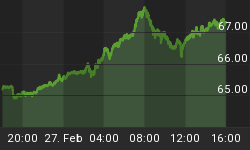This is a partial edited reprint of my article entitled "The Fed and Pavlov's Sheep" that was written and published in May of 2004. The topic is especially appropriate today.
Ivan Petrovich Pavlov was a brilliant Russian Physiologist whose experiments on animals led to discoveries that would make the demented doctors in World War II, in both Germany and Japan, very jealous. Some of Pavlov's early work was done on sheep. Unfortunately for the sheep, the experiments on them were so stressful they eventually died of heart attacks. Pavlov's work on sheep, analogous to stock market investing, is critical for this article because speculators, hedge funds, and particularly retail stock investors, do tend to act a lot like sheep.
Pavlov's work on the conditioned reflex reaction of sheep to stimuli should be of the utmost importance to the Federal Reserve and world central banks at this juncture in a world where signs of speculative excess - even to the bubble level - clearly remain in all major risk asset classes including housing, commodities, emerging markets, and even major stock markets.
In Pavlov's research, he discovered that if he gave the sheep a mild electric shock, it would bother them very little and their life would go on pretty much as if nothing had happened as long as the shocks were random. Warning the sheep in advance of a shock by ringing a bell, however, affected their behavior and it changed radically. The sheep were just smart enough to realize that if they heard the bell, the shock was coming. After repeating this exercise a few times, the poor sheep lost control of bodily functions and after a few more warning bells, they started dying of heart attacks.
What Ben Bernanke and the Federal Reserve Governors should know, and are likely to find out the hard way, is that markets driven by speculation will react just like Pavlov's sheep. Indeed, the major market participants and speculators, particularly greedy retail investors, are there to get "sheared at market tops". Somebody has to buy when the smart money wants to sell and take their winnings out of the casino. Moreover, to keep the herd of retail investing sheep grazing on financial investments including commodities, there needs to be a steady stream of "feel good" press for stocks about how great productivity is and how the nomination of the new Treasury Secretary, Hank Paulson, will be good for the dollar. All the while, stock analysts and market touts are claiming "there has never been a better time to invest".
With fears about a rising core inflation rate and slowing economic growth, Bernanke and the Federal Reserve Governors understand too much money was printed up over the last decade. They're not alone. The central banks in Europe are not done raising interest rates either and Japan is just beginning to raise their rates from zero to drain excess liquidity. After 16 rates hikes, the Fed announced it is not done raising rates. This "ringing of the bell" has the sheep sensing that more shocks are coming. This could be downright ugly for the financial markets! We would recommend that the Fed have plenty of tranquilizers and lots of liquidity available to bail out the markets if they keep on scaring the sheep.
The market participants that started running like lemmings for the edge of the cliff are led by the market professionals! They have been heard shouting "get out before the sheep panic!" Over the last few months, easy money trades are down, and some Middle Eastern markets have crashed while other emerging markets are in a bear market. Commodities are also in a serious correction, including gold and silver.
All too often central banks tighten until the financial markets suffer a significant failure. The Federal Reserve and Treasury have regular practice "fire drills" on what to do during a market crash, and given their behavior and what Pavlov taught us about sheep, they will more than likely create an opportunity to fight a real financial market fire. However, when the Fed has to fight a market event - and cuts interest rates in an effort to save the lives of some of the sheep - you can kiss the dollar goodbye. So, while the dollar has gotten a technical lift over the past week or so, my cash is still going into "non-dollar cash". The U.S. trade deficit is so massive, and our debt is so large, we believe the dollar will have to fall much lower.
While a general stock market crash may pressure all stocks (including precious metal stocks) to go lower, precious metals and precious metal stocks are being offered now at significant discounts (much of the excess that causes sharp drops in price has been washed out).
In the years ahead, the high prices we have all seen in gold and silver will be surpassed many times over. In addition, leaving your money in short-term cash with no price risk while receiving 5 percent, looks a lot better than losing money in stocks or real estate! Suddenly, risk is a four letter word and cash is not trash.















